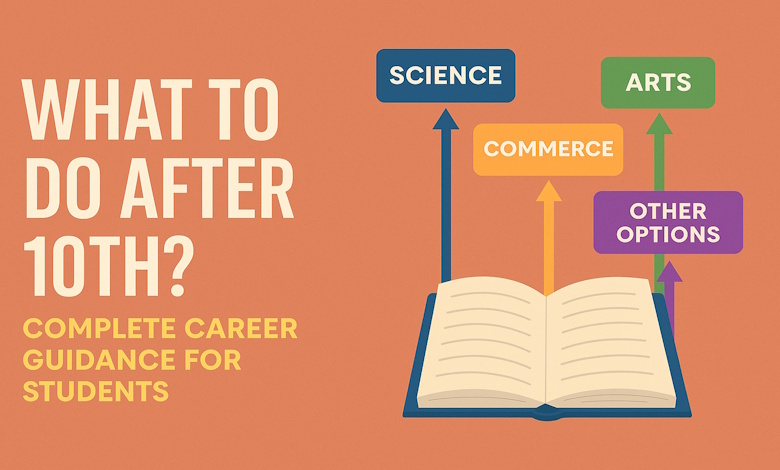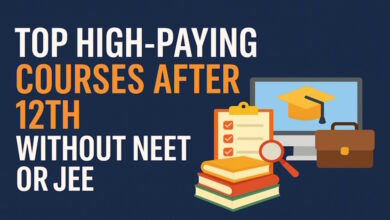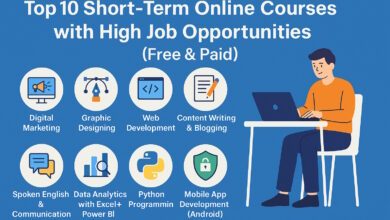What to Do After 10th? Complete Career Guidance for Students in India

Choosing the right career path after Class 10 is one of the most important decisions in a student’s life. It’s the first turning point where your decisions can shape your future career, education, and job opportunities. Many students feel confused because of the variety of options available — Science, Commerce, Arts, diploma courses, skill development, and more.
In this article, we will guide you step-by-step to understand what to do after 10th, available streams, career options, and tips to make the right choice.
🔍 Why Class 10 Is a Turning Point?
Class 10 is the foundation of your higher education. After completing 10th, you will have to choose a stream or path for Class 11 and 12 or go for skill-based courses. Your choice can affect:
- Future career (doctor, engineer, teacher, designer, etc.)
- Competitive exams (JEE, NEET, NDA, UPSC)
- College or professional courses after Class 12
That’s why it’s important to think carefully and choose the right direction.
📚 Option 1: Choose a Stream (Science, Commerce, Arts)
1. Science Stream:
Best For: Students interested in technology, medicine, or research.
Subjects: Physics, Chemistry, Biology, Mathematics, Computer Science, English.
Career Options:
- Engineering (JEE)
- Medical (NEET)
- B.Sc. (Pure Sciences)
- Defense (NDA)
- Data Science, Biotechnology, Architecture
Pros:
- Wide range of career options
- Can shift to commerce/arts later (hard to go back)
Cons:
- Subjects can be difficult
- Pressure of entrance exams
2. Commerce Stream:
Best For: Students interested in business, finance, and numbers.
Subjects: Accountancy, Business Studies, Economics, Maths/Computer, English.
Career Options:
- Chartered Accountant (CA)
- Company Secretary (CS)
- Banking, Finance, Insurance
- B.Com, MBA
- Digital Marketing, E-Commerce
Pros:
- Growing demand in India
- Scope for self-employment or business
Cons:
- Needs consistent math and accounting skills
3. Arts/Humanities Stream:
Best For: Students interested in history, literature, social science, psychology, media.
Subjects: History, Geography, Political Science, Sociology, Psychology, English, Hindi.
Career Options:
- UPSC Civil Services (IAS, IPS)
- Law, Journalism, Social Work
- BA, MA, MBA
- Teaching, Content Creation, NGO work
Pros:
- Good for creative or social careers
- Many Govt. exam options
Cons:
- Less awareness among students
- Limited private sector jobs unless skilled
🎓 Option 2: Polytechnic Diploma Courses (After 10th)
Best For: Students who want a technical skill and job after 2-3 years.
Popular Fields:
- Mechanical Engineering
- Electrical/Electronics
- Computer Engineering
- Civil Engineering
- Fashion Design
Duration: 3 years
Benefits:
- Early job opportunities
- Can enter B.Tech 2nd year via lateral entry
- Less pressure of theory
Drawbacks:
- Limited scope without higher education
- May need to study further for promotions
🖥️ Option 3: ITI (Industrial Training Institute)
Best For: Students looking for job-ready training.
Popular Trades:
- Electrician
- Fitter
- Welder
- Plumber
- Computer Operator
- Mechanic
Duration: 6 months to 2 years
Job Prospects:
- Railways, Defense, PSUs
- Private industries
- Self-employment
Pros:
- Hands-on learning
- Low cost, early jobs
Cons:
- Growth depends on experience
- Limited to certain trades
👨🎓 Option 4: Skill-Based Short-Term Courses
Ideal For: Students who want to earn side-income or build a freelancing career.
Courses:
- Graphic Design
- Digital Marketing
- Web Development
- Mobile Repair
- Tally & GST
- Spoken English
Institutes:
- NSDC (Govt. of India)
- Private Training Centers
- Online platforms (Coursera, Skill India, YouTube)
Benefits:
- Build job skills
- Work from home / Freelance
- Start early earning
💼 Option 5: Join Armed Forces (Military Schools/NDA Later)
Students can appear for RIMC, Sainik Schools, or later NDA after Class 12 with PCM or from commerce/arts for Army wing. These schools build discipline, physical strength, and prepare for careers in:
- Army
- Navy
- Air Force
- Paramilitary Forces
🧠 How to Choose the Right Option After 10th?
1. Know Your Interests:
Ask yourself:
- What subjects do I enjoy most?
- Do I like solving problems or being creative?
- Do I want a job soon or study more?
Use aptitude tests like:
- Psychometric Tests
- DMIT (Fingerprint-based test)
- Career counseling sessions
2. Talk to Experts & Parents:
Discuss with:
- Teachers
- Career counselors
- Family (they know your strengths)
But remember: Final decision is yours.
3. Think Long-Term:
Don’t choose a stream because:
- Your friends chose it
- Family pressure
- You heard it has more “scope”
Think about what you want to become in the future.
4. Research Career Paths:
Use tools like:
- YouTube career channels
- Sarkari Naukri portals
- Government career guidance websites
- National Career Service (https://www.ncs.gov.in)
🧭 Govt. Schemes Supporting Students After 10th
✅ Skill India Mission
Free/low-cost courses under NSDC in over 40 sectors.
✅ PMKVY (Pradhan Mantri Kaushal Vikas Yojana)
Offers training + placement for skilled students.
✅ NIOS (Open Schooling)
Students who failed 10th or want flexible study options.
🛑 Mistakes to Avoid After 10th
- Don’t blindly follow friends or relatives
- Don’t take Science just for “status”
- Don’t choose a stream without knowing career options
- Don’t ignore skill-based education
- Don’t assume one stream is better than the other
✅ Career Planning Tips for Students
- Take time to decide, don’t rush
- Attend online webinars and career expos
- Learn one digital skill no matter your stream
- Improve your communication and English skills
- Start exploring part-time learning (like typing, computer courses)
📌 Summary Table: Options After 10th
| Option | Duration | Career Example | Suitable For |
|---|---|---|---|
| Science | 2 years (11-12) | Doctor, Engineer, Scientist | Math/Bio Lovers |
| Commerce | 2 years | CA, Banker, Business | Business-minded |
| Arts | 2 years | UPSC, Journalist | Creative/Social interest |
| Polytechnic | 3 years | Engineer (Diploma) | Practical Learners |
| ITI | 6 months – 2 years | Electrician, Mechanic | Hands-on learners |
| Skill Courses | Short-term | Designer, Freelancer | Job-ready skills |
| NDA/Military | 2+ years | Armed Forces | Physically Active |
🙋 FAQs (Frequently Asked Questions)
Q1: Which stream is best after 10th?
There is no “best” stream. It depends on your interests, goals, and abilities. Science is good for technical fields, commerce for business, and arts for social/creative careers.
Q2: Can I change my stream later?
It’s easier to shift from science → commerce or arts, but difficult the other way. So choose carefully.
Q3: Are diploma or ITI courses better than Class 12?
They are job-focused and good for early employment, but for higher positions, you may need a degree later.
Q4: Can I do government jobs after 10th?
Yes. You can apply for:
- SSC MTS
- Railway Group D
- Army (Soldier)
- Police constable (in some states)
But many jobs require 12th or graduation.
Q5: Is commerce without math a good choice?
Yes. You can still become CA, pursue B.Com, MBA, and other courses.
📝 Final Words
Your career starts the moment you complete Class 10. It’s not about taking the toughest stream — it’s about finding what suits you. Whether you choose science, commerce, arts, or skill-based education — stay focused, keep learning, and grow with confidence.
If you still feel confused, take guidance from school teachers or online counselors. The right decision today can change your entire future!

